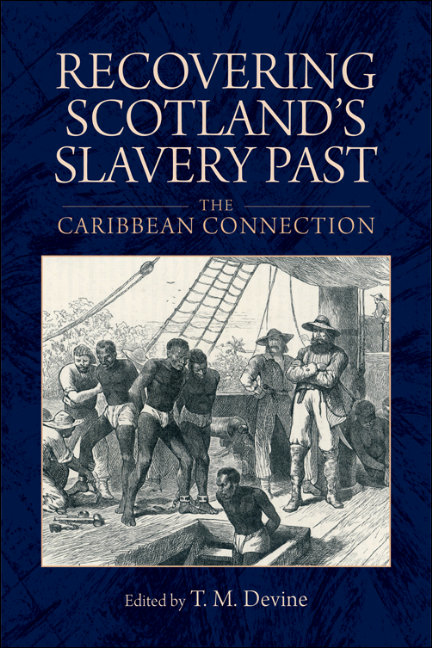Book contents
- Frontmatter
- Contents
- List of Illustrations and Tables
- List of the Contributors
- Acknowledgements
- Foreword
- map
- Introduction: Scotland and Transatlantic Slavery
- 1 Lost to History
- 2 Yonder Awa: Slavery and Distancing Strategies in Scottish Literature
- 3 Early Scottish Sugar Planters in the Leeward Islands, c. 1660–1740
- 4 The Scots Penetration of the Jamaican Plantation Business
- 5 ‘The habits of these creatures in clinging one to the other’: Enslaved Africans, Scots and the Plantations of Guyana
- 6 The Great Glasgow West India House of John Campbell, senior, & Co.
- 7 Scottish Surgeons in the Liverpool Slave Trade in the Late Eighteenth and Early Nineteenth Centuries
- 8 Scotland and Colonial Slave Ownership: The Evidence of the Slave Compensation Records
- 9 ‘The Upas Tree, beneath whose pestiferous shade all intellect languishes and all virtue dies’: Scottish Public Perceptions of the Slave Trade and Slavery, 1756–1833
- 10 ‘The most unbending Conservative in Britain’: Archibald Alison and Pro-slavery Discourse
- 11 Did Slavery make Scotia Great? A Question Revisited
- Conclusion: History, Scotland and Slavery 246
- Index
1 - Lost to History
Published online by Cambridge University Press: 15 December 2017
- Frontmatter
- Contents
- List of Illustrations and Tables
- List of the Contributors
- Acknowledgements
- Foreword
- map
- Introduction: Scotland and Transatlantic Slavery
- 1 Lost to History
- 2 Yonder Awa: Slavery and Distancing Strategies in Scottish Literature
- 3 Early Scottish Sugar Planters in the Leeward Islands, c. 1660–1740
- 4 The Scots Penetration of the Jamaican Plantation Business
- 5 ‘The habits of these creatures in clinging one to the other’: Enslaved Africans, Scots and the Plantations of Guyana
- 6 The Great Glasgow West India House of John Campbell, senior, & Co.
- 7 Scottish Surgeons in the Liverpool Slave Trade in the Late Eighteenth and Early Nineteenth Centuries
- 8 Scotland and Colonial Slave Ownership: The Evidence of the Slave Compensation Records
- 9 ‘The Upas Tree, beneath whose pestiferous shade all intellect languishes and all virtue dies’: Scottish Public Perceptions of the Slave Trade and Slavery, 1756–1833
- 10 ‘The most unbending Conservative in Britain’: Archibald Alison and Pro-slavery Discourse
- 11 Did Slavery make Scotia Great? A Question Revisited
- Conclusion: History, Scotland and Slavery 246
- Index
Summary
THE RECORD OF THOSE Scots who helped achieve the abolition of the slave trade in 1807 and then slavery itself within the British Empire in 1833 has already been well recorded in books by C. Duncan Rice and Iain Whyte. Yet Scottish engagement in the slave system itself was either ignored or lost from both academic history and popular memory for generations until the early years of the present century. When amnesia started to take root is difficult to determine. Compensation to Scots slave owners after emancipation remained a live issue into the late 1830s as assessment of claims was not completed until 1837. However, a mere four decades later, on the fiftieth anniversary commemoration of abolition in 1883, the Glasgow West India Association felt able to publish a triumphalist statement in the Glasgow Herald newspaper:
It is to Glasgow's lasting honour that while Bristol and Liverpool were up to their elbows in the slave trade, Glasgow kept out of it. The reproach can never be levelled at our city as it was at Liverpool that there was not a stone in her streets that was not cemented with the blood of a slave.
This bold assertion was remarkable at several levels.
For a start, the claim was brazenly hypocritical. Just a generation before it was made, the city's West India Association had been one of the most vocal and powerful anti-abolition pressure groups in the United Kingdom, famed for its unyielding and unrelenting opposition to the liberation of slaves in the Empire. The statement is confined to slave trading alone and in isolation. As shown below, direct trafficking of slaves from Africa to the Americas by Scottish ships from Scottish ports was indeed on a minor scale compared to the enormous human trade conducted from the major English centres. Hence, by ignoring Scottish involvement in the slave economies more generally, the Association was able to claim the moral high ground for Glasgow and the city's transatlantic business community.
- Type
- Chapter
- Information
- Recovering Scotland's Slavery PastThe Caribbean Connection, pp. 21 - 40Publisher: Edinburgh University PressPrint publication year: 2015



